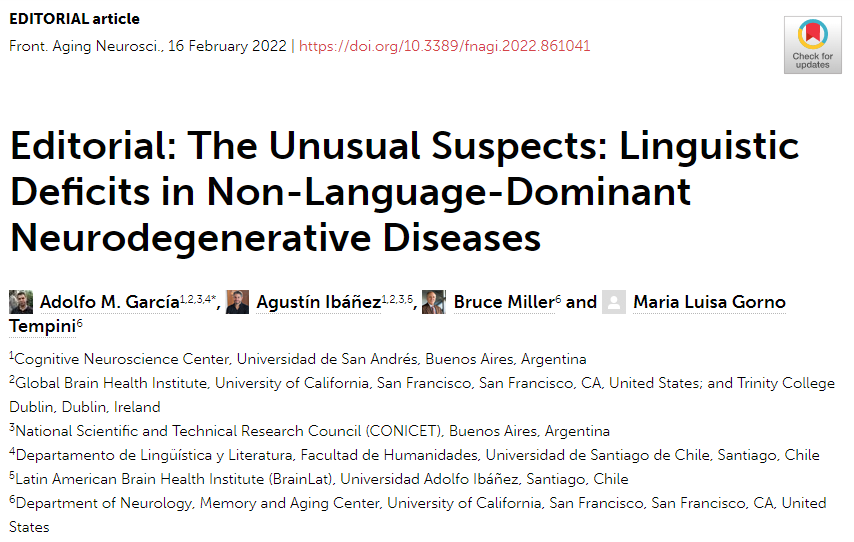Editorial: The unusual suspects: Linguistic deficits in non-language-dominant neurodegenerative diseases
García, A. M., Ibáñez, A., Miller, B., Gorno Tempini, M. L. (2022). Editorial: The unusual suspects: Linguistic deficits in non-language-dominant neurodegenerative diseases. Frontiers in Aging Neuroscience 14, 861041.
Este trabajo realza la importancia de las evaluaciones lingüísticas en síndromes neurodegenerativos que no se tipifican por síntomas verbales. Se describen diez trabajos convocados para explorar esta temática, con foco en la enfermedad de Alzheimer, el deterioro cognitivo leve, la variante conductual de la demencia frontotemporal, la parálisis supranuclear progresiva, el síndrome corticobasal y la enfermedad de Parkinson. En su conjunto, estos trabajos delinean una nueva agenda transnosológica para la neurolingüística clínica.
Para acceder al artículo, hacé click aquí.
Editorial: The unusual suspects: Linguistic deficits in non-language-dominant neurodegenerative diseases
García, A. M., Ibáñez, A., Miller, B., Gorno Tempini, M. L. (2022). Editorial: The unusual suspects: Linguistic deficits in non-language-dominant neurodegenerative diseases. Frontiers in Aging Neuroscience 14, 861041.
Discussions on linguistic deficits in neurodegenerative diseases are often circumscribed to primary progressive aphasia. Yet, verbal dysfunctions are also pervasive across neurodegenerative diseases typified by mnesic, socio-cognitive, or motoric alterations (García et al., 2022). This has been shown, for instance, in Alzheimer’s disease (AD) (Taler and Phillips, 2008), behavioral variant frontotemporal dementia (bvFTD) (Geraudie et al., 2021a,b)(Geraudie et al., 2021a,b), progressive supranuclear palsy syndrome (PSPs) (Peterson et al., 2021), corticobasal syndrome (CBS) (Peterson et al., 2021), and Parkinson’s disease (PD) (Birba et al., 2017). With a few exceptions (Boschi et al., 2017; García et al., 2022), however, relevant evidence has been compiled for each disorder separately, failing to foreground the transnosological import of language assessments in behavioral neurology. The present Research Topic directly addresses this need.
To access the full paper, please click here.



